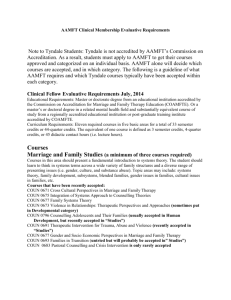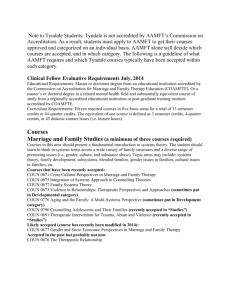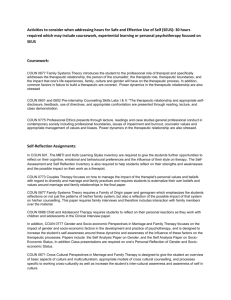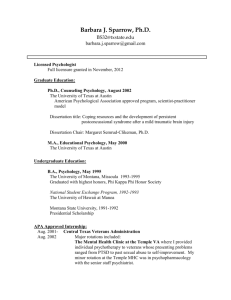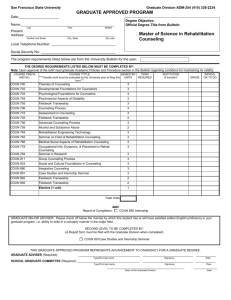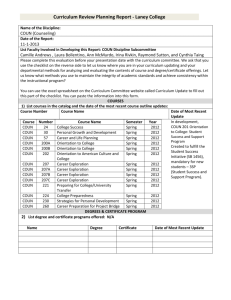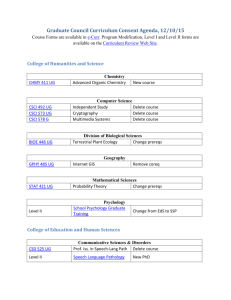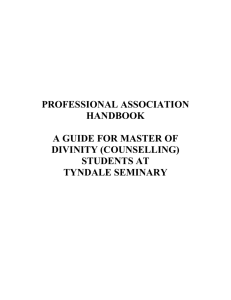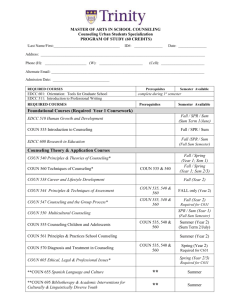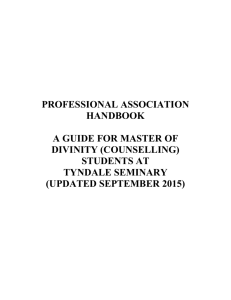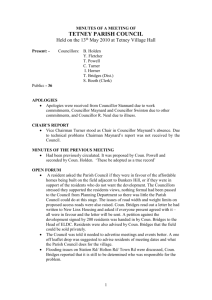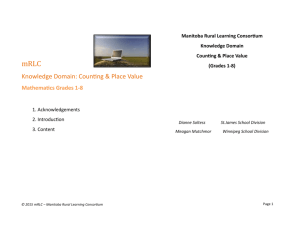Clinical Membership Requirements
advertisement
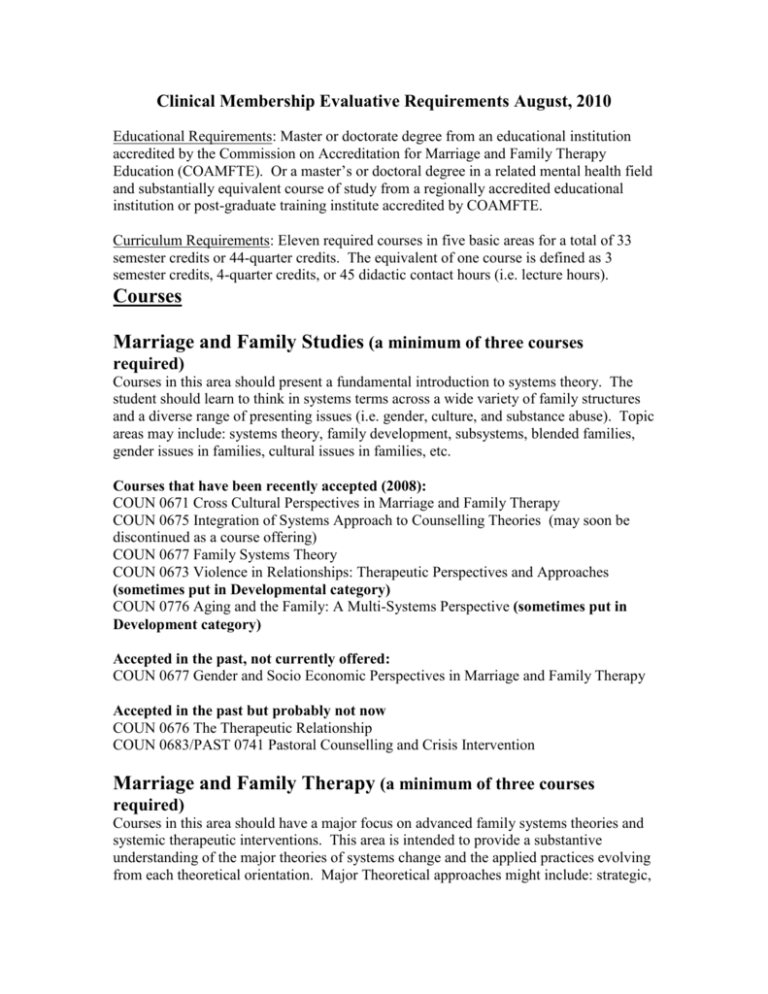
Clinical Membership Evaluative Requirements August, 2010 Educational Requirements: Master or doctorate degree from an educational institution accredited by the Commission on Accreditation for Marriage and Family Therapy Education (COAMFTE). Or a master’s or doctoral degree in a related mental health field and substantially equivalent course of study from a regionally accredited educational institution or post-graduate training institute accredited by COAMFTE. Curriculum Requirements: Eleven required courses in five basic areas for a total of 33 semester credits or 44-quarter credits. The equivalent of one course is defined as 3 semester credits, 4-quarter credits, or 45 didactic contact hours (i.e. lecture hours). Courses Marriage and Family Studies (a minimum of three courses required) Courses in this area should present a fundamental introduction to systems theory. The student should learn to think in systems terms across a wide variety of family structures and a diverse range of presenting issues (i.e. gender, culture, and substance abuse). Topic areas may include: systems theory, family development, subsystems, blended families, gender issues in families, cultural issues in families, etc. Courses that have been recently accepted (2008): COUN 0671 Cross Cultural Perspectives in Marriage and Family Therapy COUN 0675 Integration of Systems Approach to Counselling Theories (may soon be discontinued as a course offering) COUN 0677 Family Systems Theory COUN 0673 Violence in Relationships: Therapeutic Perspectives and Approaches (sometimes put in Developmental category) COUN 0776 Aging and the Family: A Multi-Systems Perspective (sometimes put in Development category) Accepted in the past, not currently offered: COUN 0677 Gender and Socio Economic Perspectives in Marriage and Family Therapy Accepted in the past but probably not now COUN 0676 The Therapeutic Relationship COUN 0683/PAST 0741 Pastoral Counselling and Crisis Intervention Marriage and Family Therapy (a minimum of three courses required) Courses in this area should have a major focus on advanced family systems theories and systemic therapeutic interventions. This area is intended to provide a substantive understanding of the major theories of systems change and the applied practices evolving from each theoretical orientation. Major Theoretical approaches might include: strategic, structural, object relations family therapy, behavioral family therapy, communications family therapy, intergenerational family therapy, and systemic sex therapy. Courses that have been recently accepted (2008): COUN 0772 Theories and Methods of Family Therapy I COUN 0773 Couple Therapy: An Integrative Perspective COUN 0774 Theories and Methods of Family Therapy II Human Development (a minimum of three courses required) Courses in this area should provide knowledge of individual personality development and its normal and abnormal manifestations. The student should have relevant coursework in human development across the life span, which includes special issues that effect an individual’s development (i.e. culture, gender, and human sexuality). This material should be integrated with systems concepts. Topic areas may include: human development, child/adolescent development, psychopathology, personality theory, human sexuality, etc. Test and measurement courses are not accepted toward this area. Courses that have been recently accepted (2008): COUN 0573 Foundations II: The Nature of Personhood (no longer offered) COUN 0654 Human Development and Learning (with Dr. Siew) COUN 0672 Human Sexuality and the Therapeutic Relationship COUN 0674 Personality Theories COUN 0679 Current Issues in Psychopathology COUN 0688 Child and Adolescent therapy COUN 0780 Therapeutic and systemic Approaches to Addictions COUN 0673 Violence in Relationships: Therapeutic Perspectives and Approaches (sometimes put in the Studies category) COUN 0776 Aging and the Family: A Multi-system Perspective (sometimes put in the Studies category) Accepted in the past: COUN 0682 Adolescent Development and Culture (YMIN 0591) (no longer offered?) Note: 0574 Foundational Perspective of Christian Counselling, Labs I and II, and 0796 Counselling Adolescents and Their Families have been consistently rejected and Therapeutic relationship has been recently rejected Professional Ethics (a minimum of one course required) Courses in this area are intended to contribute to the professional development of the therapist. Areas of study should include the therapist’s legal responsibilities and liabilities, professional ethics as a marriage and family therapist, professional socialization, and the role of the professional organization, licensure or certification legislation, independent practice and interprofessional cooperation. Religious ethics courses and moral theology courses are not accepted toward this area. Course that has recently been accepted (2008) COUN 0775 Professional Ethics Research (a minimum of one course required) Courses in this area should assist students in understanding and performing research. Topic areas may include: research methodology, quantitative methods and statistics. Course that has recently been accepted (2008) COUN 0680/CHED 0758 Research Methods in Education and Counselling Practicum Requirement: Minimum one (1) year, supervised clinical practicum, with 300 hours of direct client contact with individuals, couples, and families. This requirement may be completed during master’s or doctorate degree without an AAMFT approved supervisor. Applicants who did not complete a clinical practicum may document this requirement with their first 300 post-graduate client contact hours, supervised by an AAMFT Approved Supervisor, supervisor candidate or by an alternate supervisor accepted by the AAMFT specifically for you. Courses recently accepted in this area: COUN 0701 Counselling Major Internship Post-Graduate Clinical Experience: Minimum of two (2) years of professional work experience in marriage and family therapy following receipt of master’s or doctorate degree. Post-graduate clinical experience includes both client contact and supervision hours, which must be completed concurrently. All clinical work must be supervised by a qualified supervisor (AAMFT Approved Supervisor or supervisor candidate). Individuals must complete a minimum of 200 hours of supervision concurrently on 1,000 hours of client contact in marriage and family therapy. At least 100 hours of the 200 hours must be individual supervision. AAMFT will accept a maximum of 100 hours of group supervision Alternate Supervisor Qualifications: Supervisor should possess the educational and clinical requirements as described above, plus a valid state license/certification. The supervisor should also have completed following minimum requirements: -Five (5) years of professional work experience in marriage and family therapy. -Three (3) years supervising marriage and family therapy trainees. -Thirty-six (36) hours of supervision of supervision -Graduate marriage and family therapy supervision courses
